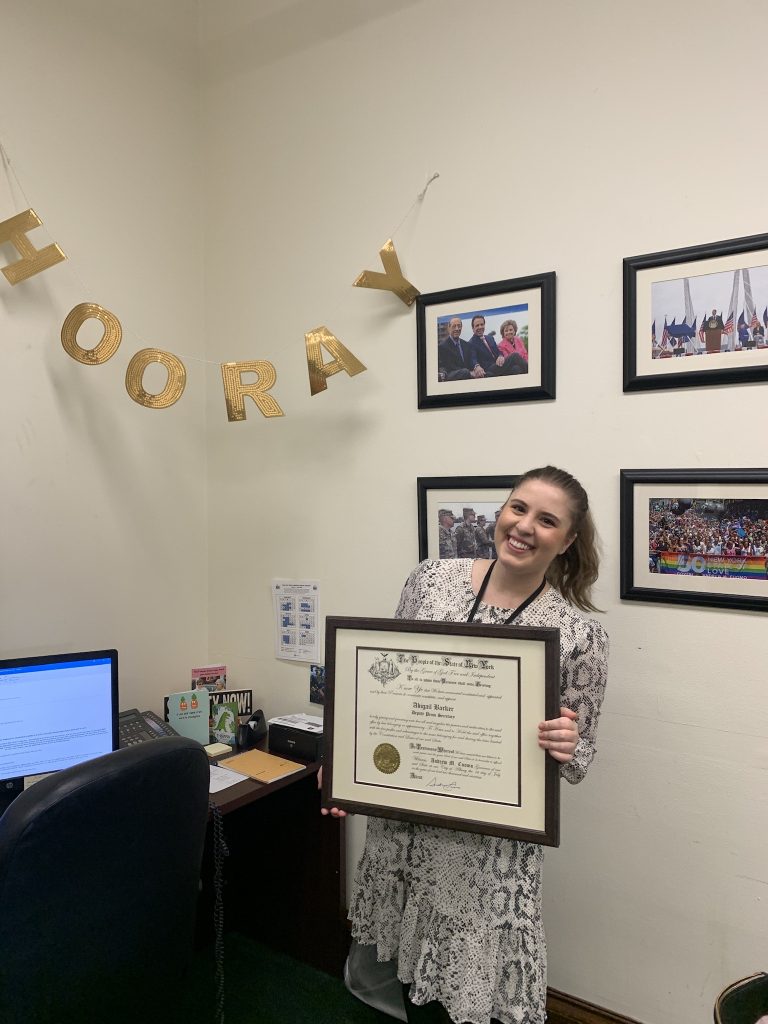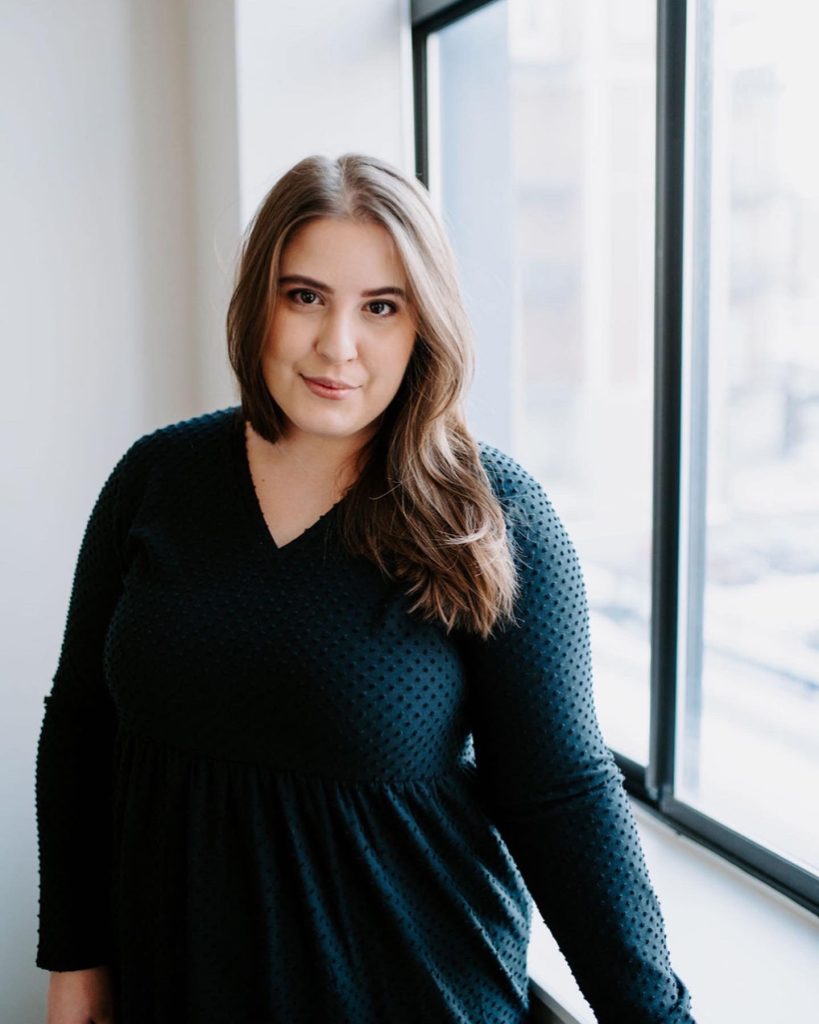Abigail Barker ’15: Communicating through crisis
March 20, 2023 · 2023
After 10 years in communications, much of it in crisis situations, Abigail Barker ’15 can safely say: “I love mess. I am always drawn to work where the stakes are high, on subject matters that are challenging and dynamic.”
The Rensselaer County native came to Saint Rose at 16 to take a few classes. Once she matriculated, she immersed herself in the English program. Even as a teen, Barker also pursued a career, combining her studies with jobs and paid internships.
At 29, she has an extensive resume in communications – in the fashion industry, politics, public service, and the corporate world. She was front and center during the worst of the pandemic as a deputy press secretary on former New York Gov. Andrew Cuomo’s communications team. Barker served as well as a spokesperson for the New York State Department of Health and a public information officer for the Office of Children and Family Services.
Today, she is vice president of crisis and reputation risk for Edelman, among the world’s largest communications firms. Barker also serves, alongside several Saint Rose professors, on the executive board of START Children’s Center an advocacy center in Rensselaer County.
Here, she discusses her appreciation for writing and reading, her switch from fashion to public service, and months of 24-7 work for the governor:
On doing things in her own fashion: I was homeschooled, which gave me the opportunity to explore my interests and find my passions. I joined the PIE program at Saint Rose designed for high school students. It was a very supportive environment and most people didn’t realize my age.
I worked my first New York Fashion Week when I was 17. I started writing for Astonish Magazine, a startup fashion magazine; then worked for costume designer Bob Mackie. I’d live in New York City during summer and winter school breaks. In my senior year, I’d spend the first half of the week at home, then go down to work after my last class.
I was a Jane-of-all-trades in Bob’s New York office, handling social media, customer calls and emails, assisting with public events and projects related to his QVC collection. Three days after graduation, I moved to the city.
Her fashion break up: The 2016 election helped me understand just how pervasively divided this country is. I started writing for news startup Rantt.com and caught the government and politics bug. I wanted to do something with my life that provided more satisfaction than what the fashion industry could offer. It was a gigantic moment in American history, especially politics, and I wanted to be part of it.

Abigail Barker after receiving her Chamber appointment (deputy press secretary) certificate in February 2020.
Her turn to public service: I got a job for the field campaign for (U.S. Congressmember) Paul Tonko’s 2018 re-election. Everyone knows and loves the Congressman, and I’m glad to say he’s just as wonderful as you may think.
I was back in Albany in government and got to meet a ton of people, which in this business, is often how the next job comes along.
Crisis communications 101: I became a public information officer with the New York State Office of Children and Family Services. Good news is often hard to come by at agencies that deal with social services, and this job was my introduction into crisis communications.
My job was handling social media and writing press releases, which taught me the basics of media relations at the state level. It was very eye-opening to see the failures of the system every day, which I would otherwise not have been as acutely aware of. It was at OCFS where I learned how to strike the balance between acknowledging the weight of crisis situations while still communicating effectively with the public.
And onto COVID-19: I joined the governor’s office in June 2019. I was doing the press advance before COVID; then that became the bulk of my job. I handled events located above Yonkers. I’d hear ‘We’re going to Buffalo tomorrow,’ then drive out to Buffalo. Once you get to the hotel, you call through the list of media outlets and tell all the reporters ‘Tomorrow we’re holding a presser at 11 or 11:30. See you there.’ Then I’d stand in the back while the governor did his thing and make sure the press had what they’d need. Then you’d get back in your car and head back to Albany, unless someone said, ‘Tomorrow we’re going to Syracuse.’
During the Cuomo administration, all executive chamber appointees received a pin with the state seal and the words, ‘I work for the people’ surrounding the seal. Throughout the late nights, early mornings, hours-long conference calls, and hundreds of briefings, those words served as a poignant reminder of what and who the work is for.
I’m deeply proud of the work accomplished by my colleagues and I, not just during COVID, but throughout our time in the administration.
More crisis: In June of 2021, I went to the New York State Department of Health as a spokesperson. While my time there was brief, I was able to take everything I learned about media relations at OCFS and in the governor’s office and put it into practice. From conducting media trainings with state epidemiologists to managing, on average, 15 press inquiries a day. COVID was, and is, far from over, and handling milestone moments like back to school 2021 was a huge moment in my career.
Back to NYC: In November 2021, I started working at Edelman, the largest privately held communication firm in the world. I am a vice president in the crisis and reputation risk team. It’s been an awesome experience that brought me back to New York City after five years back upstate. The city is different than before COVID, but it’s still greatest place in the world.
In government, ‘crisis’ meant a natural disaster, a pandemic, or half of Manhattan being without power for six-plus hours. But coming into the corporate world at Edelman, the crisis umbrella covers a wide range of definitions. Someone might say ‘Could you review a newsletter we’re sending to employees?’ Other times we’re in the middle of a huge issue, like a food recall.
The work is dynamic. You aren’t doing the same thing every day. In communications, especially crisis, if you’re bored, that’s your fault.
On Saint Rose: The professors were really supportive. When I wanted to go to New York, (English Professor) Dan (Nester) said ‘rock on.’ No one tried to fit me in a box. They wanted me to follow my passions. Dan changed the game for me. He created a beautiful, artistic space to do the best writing I’ve ever done.
Brian Sweeney was empowering in teaching us how to read and evaluate. I still use this training, both for myself and with junior staff I conduct media trainings with. To be a good writer, you have to be an excellent reader.
I’m a firm believer in the liberal arts, and an English degree provides the basic skills. If you can critically read, understand, and write, those are skills you’ll carry for the rest of your life. Language is so important to how I present things to clients and to the media. Having a solid grasp on the language, and being able to communicate effectively, that’s my whole job.
By Jane M. Gottlieb


